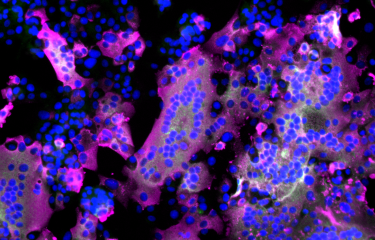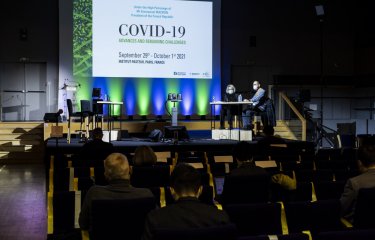Inflammatory responses to SARS-CoV-2 vary hugely from one individual to the next. Physicians and scientists from the Institut Pasteur, St. James's Hospital in Dublin and Trinity College Dublin have identified factors of increased vulnerability to COVID-19 in some people, which could guide the development of new therapeutic strategies. In particular, the scientists discovered a link between severe forms of the disease and a difficulty or inability to produce a key antiviral protein known as type I interferon. The study was published on November 25, 2022 in the journal Nature Communications.
Previous research involving several of the scientists who contributed to this study had already shown that reduced type I interferon production in patients with a severe SARS-CoV-2 infection prevented elimination of the viral infection and led to clinical worsening. Genes encoding proteins in the type I interferon signaling pathway had also previously been identified as risk factors for developing severe COVID-19 infection.
In this study, the scientists examined in patient cohorts why simply administering type I interferon-based treatment has been ineffective, especially in patients with a severe form of the disease. The collaborative French-Irish study demonstrated that when type I interferon was added to the blood of patients with a severe form of COVID-19, their immune cells became more inflammatory than those of people with a much milder form of the disease.
"We have of course long known that people respond very differently to COVID-19 – some remain relatively well or are even asymptomatic, while others get very sick and some tragically die," explains Darragh Duffy, Head of the Translational Immunology Unit at the Institut Pasteur and last author of the study. "The results are exciting as they may help explain why therapeutic use of type I interferon late in infection has failed despite many studies showing how important this protein is in early infection," he adds.
The results of the study show the importance of interferon testing much earlier in the development of the disease and highlight the need to screen individuals with compromised responses, whether because of genetic factors, autoantibodies or treatments, to anticipate complications related to COVID-19 or other acute viral infections.
"This study reveals important new insights into why inadequate and inappropriate type I interferon responses can be so detrimental in COVID-19, which helps us to understand more about the early biological immune processes that go wrong in people with severe disease," explains Nollaig Bourke, a scientist at Trinity College Dublin. "Novel useful clinical research like this that helps us understand how we are vulnerable to COVID-19 requires teams of people with different skills and expertise like the authors of this paper who come from diverse clinical and scientific backgrounds. It's thanks to funding from SFI, AIB and the Institut Pasteur that this has been possible," concludes Cliona O'Farrelly, a Professor of Comparative Immunology at Trinity College Dublin.
The study was carried out with the St. James's Hospital Dublin cohort and the French COVID-19 (Inserm) cohort and was funded by the Institut Pasteur's "URGENCE COVID-19" fund (the CoVarImm and "response to steroids" studies), the French National Research Agency (ANR-flash COVID-19), the "Milieu Intérieur" Laboratory of Excellence, the IMMUNOV fund for innovation in immunopathology (B.T.), the Science Foundation Ireland (SFI), the ANRS | Emerging Infectious Diseases (EP36XII) and the NIH (1UM1AI164562-01).
The scientists would like to thank the TCD/SJH/TUH STTAR-Bioresource for COVID-19, which gave them access to patient samples, and the AP-HP (Paris Public Hospital Network) staff involved in diagnosing and treating patients at Cochin Hospital, Bichat Hospital and St. James's Hospital in Dublin.
Source :
Defective activation and regulation of type I interferon immunity is associated with increasing COVID-19 severity, Nature Communications, 25th November 2022
Nikaïa Smith 1,21, Céline Possémé 1,21, Vincent Bondet 1,21, Jamie Sugrue 2, Liam Townsend 3,4, Bruno Charbit 5, Vincent Rouilly6, Violaine Saint-André1,7, Tom Dott5, Andre Rodriguez Pozo1, Nader Yatim1, Olivier Schwartz 8, Minerva Cervantes-Gonzalez9,10,11, Jade Ghosn9,11, Paul Bastard 12,13,14,15, Jean Laurent Casanova 12,13,14,15,16, Tali-Anne Szwebel17, Benjamin Terrier17, Niall Conlon18,19, Cliona O’Farrelly 2,19, Clíona Ní Cheallaigh3,4, Nollaig M. Bourke 20 & Darragh Duffy 1,5
1Translational Immunology Unit, Institut Pasteur, Université Paris Cité, Paris, France.
2School of Biochemistry and Medicine, Trinity Biomedical Sciences Institute, Trinity College Dublin, Dublin, Ireland.
3Discipline of Clinical Medicine, School of Medicine, Trinity Translational Medicine Institute, Trinity College Dublin, Dublin, Ireland.
4Department of Infectious Diseases, St James’s Hospital, Dublin, Ireland.
5Institut Pasteur, Université Paris Cité, CBUTechS, Center for Translational Research, Paris, France.
6Datactix, Bordeaux, France.
7Department of Computational Biology, Université Paris Cité, Bioinformatics and Biosta- tistics HUB, Institut Pasteur, Paris, France.
8Department of Virology, Virus and Immunity Unit, Institut Pasteur, Paris, France.
9Infectious and Tropical Diseases Department, AP-HP, Hôpital Bichat, Paris, France.
10Epidemiology, Biostatistics and Clinical Research Department, AP-HP, Hôpital Bichat, Paris, France.
11Université de Paris, INSERM, IAME, UMR 1137 Paris, France.
12Department of Pediatrics, Necker Hospital for Sick Children, AP-HP, Paris, France.
13Laboratory of Human Genetics of Infectious Diseases, Necker Branch, INSERM U1163, Necker Hospital for Sick Children, Paris, France.
14Université Paris Cité, Imagine Institute, Paris, France.
15St. Giles Laboratory of Human Genetics of Infectious Diseases, Rockefeller Branch, The Rockefeller University, New York, NY, USA.
16Howard Hughes Medical Institute, New York, NY, USA.
17Institut Cochin, APHP, Paris, France.
18Department of Immunology, St James’s Hospital, Dublin, Ireland.
19Discipline of Immunology, School of Medicine, Trinity College Dublin, Dublin, Ireland.
20Discipline of Medical Gerontology, School of Medicine, Trinity Translational Medicine Institute, Trinity College Dublin, Dublin, Ireland.
21These authors contributed equally: Nikaïa Smith, Céline Possémé, Vincent Bondet
https://doi.org/10.1038/s41467-022-34895-1





